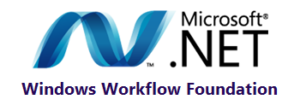 19. What is a runtime engine?
19. What is a runtime engine?
A runtime engine of WF provides the basic functionality to execute and manage the workflow lifetime. It runs within the host process and is responsible for executing each workflow instance. A host process can interact with multiple runtime engines at a time, where each engine executes multiple workflow instances. The host process interacts with runtime engine by using any of the following classes:
WorkflowInvoker – Invokes a workflow as its method.
WorkflowApplication – Controls the execution of a single workflow instance explicitly.
WorkflowServiceHost – Hosts the workflows and allows sending and receiving messages among various instances of workflows.
20. What is an activity?
In Windows Workflow Foundation 4.0, an activity is the basic unit of composition and execution of a workflow. Each activity in a workflow consists of its own variables and arguments and is a subclass of the Activity class. These activities provide facilities for flow control, exception handling, data persistency, loading or unloading workflows, tracking, and transaction flow.
21. Explain why workflows are based on Extensible Models.
Workflows serve the purpose of automating business processes. Now, since each type of business has a wide range of problems; therefore, a workflow platform needs to be extensible. WF provides you with a set of base activities, such as IfElse, Code, and Delay, to build a workflow. You can extend these activities or build new activities to meet your requirements. Besides activities, you can also extend services, such as tracking, management, and persistence, provided by the runtime engine.
22. Write the steps that are involved in the sequential workflow, by default.
By default, a sequential workflow has only two steps:
Start
Finish